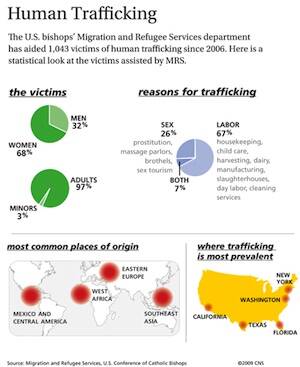Deeply mired in a controversy over a new mandate for the provision of contraception services, the U.S. Conference of Catholic Bishops and the U.S. Department of Health and Human Services nevertheless remain partners in social services involving millions of dollars in federal funding and over the past year or so on one court docket in Massachusetts. On March 23 a U.S. District Court decision there added another layer of complexity to the ongoing dispute over religious liberty between the Obama administration and U.S. bishops.
Judge Richard Stearns ruled that the terms of a Department of Health and Human Services contract with the U.S. bishops’ Office of Migration and Refugee Services, as the American Civil Liberties Union of Massachusetts charged, indeed constituted a violation of the First Amendment’s establishment clause. Stevens decided a religious accommodation accepted by H.H.S. and written into the contract with M.R.S. allowed the bishops’ agency to impose a religiously based restriction on the disbursement of taxpayer-funded services. That accommodation permitted M.R.S. to prohibit its social service subcontractors from providing abortion or contraception counseling or services to trafficking victims.
Calling the ruling “a disappointment,” Mary Ann Walsh, R.S.M., director of media relations for the bishops’ conference, said, “The decision seems to ignore the right of free expression of one’s religious beliefs.” She added, “It’s very likely that we would appeal.” She said the conference’s general counsel was reviewing the decision.
The Massachusetts A.C.L.U. had sued H.H.S. to contest the five-year contract for services for human trafficking victims awarded to M.R.S. The office had been hired as a national general contractor for social services for women escaping human trafficking. The office was not selected for a renewal of that service last year, launching one of the U.S.C.C.B.’s ongoing conflicts over religious liberty with the Obama administration.
According to court documents, M.R.S. entered into subcontracts with over 100 service providers nationally; each contract included the restriction on abortion or birth control counseling. The Massachusetts A.C.L.U. argued that the government “would appear to have endorsed a Catholic belief” and impermissibly delegated discretion to the U.S. bishops.
Judge Richard G. Stearns agreed. He wrote, “Here…the restriction on the use of [federal] funds for abortion services and contraceptive materials is not a subject of truly voluntary parti-cipation; subcontracting organizations and trafficking victims cannot ‘opt out’ of the restriction without shouldering the financial burden of doing so.
“The government defendants’ delegation of authority to the U.S.C.C.B. to exclude certain services from government funding ‘provides a significant symbolic benefit to religion,’ in violation of the Establishment Clause,” he added.
“To insist that the government respect the separation of church and state is not to discriminate against religion; indeed, it promotes a respect for religion by refusing to single out any creed for official favor at the expense of all others,” the judge said.
Stevens added a final observation: “This case is not about government forcing a religious institution to act contrary to its most fundamental beliefs. No one is arguing that the U.S.C.C.B. can be mandated by government to provide abortion or contraceptive services or be discriminated against for its refusal to do so. Rather, this case is about the limits of the government’s ability to delegate to a religious institution the right to use taxpayer money to impose its beliefs on others (who may or may not share them).”








